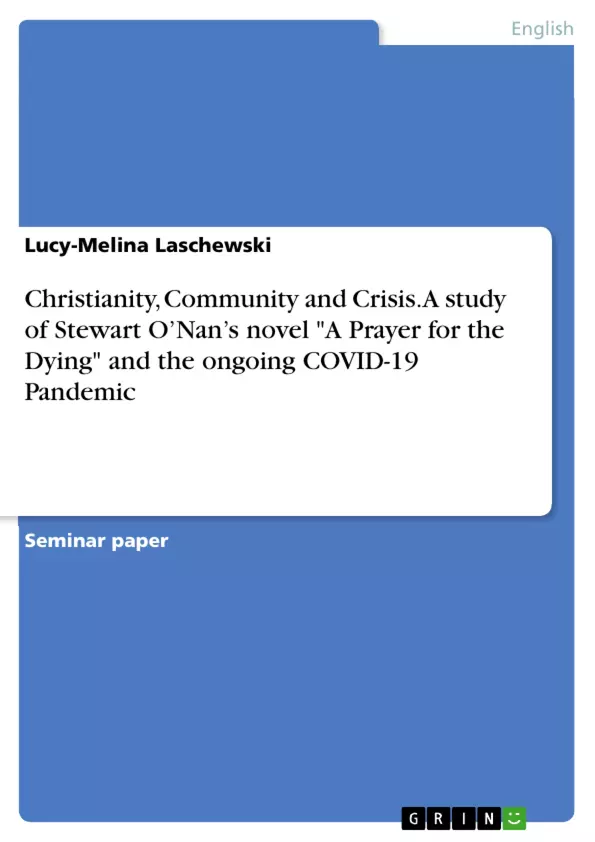How challenging the fulfillment of one’s own role in society and the co-occurring responsibilities, as well as weighting up mental well-being against physical health, during an imminent crisis can become, is something the protagonist of Stewart O’Nan’s novel "A Prayer for the Dying" becomes painfully aware of. Set a few years after the Civil War, Jacob Hansen has just returned from the war and now holds the office of Sheriff, Pastor and Undertaker in the small Wisconsin town Friendship – he is a dutiful man who takes his roles very seriously. When a deadly epidemic, Diphtheria, starts to spread around the townspeople, Jacob struggles between keeping the town safe and maintaining his sanity, troubled by post-traumatic stress disorder. However, the townspeople are not very compliant and a threatening natural catastrophe further strains Jacob’s moral disposition as he has to decide between leaving the sick to die and saving those not struck by disease.
This paper aims to elaborate on how in general diseases may be instrumentalized to fit a certain persons or groups psychological needs, and how especially the question of responsibility, as well as the virological imperative, steers a community’s behavior in the face of an epidemic/pandemic. Further, it will discuss the ethical and inner conflicts concerning the measures taken to overcome the threat of a deadly disease. In concern to this, the self as "evil object" will be explained and, inter alia, measures such as isolative quarantine will be discussed exemplarily. Stewart O’Nan’s A Prayer for the Dying, as well as recent literature regarding the ongoing COVID-19 pandemic will function as analytical basis for this paper. Lastly, I will try to formulate an assessment of the situation’s outcome in O’Nan’s novel and will provide a short outlook on a possible positive impact the Coronavirus pandemic may have on our society.
Inhaltsverzeichnis (Table of Contents)
- Introduction
- A faceless evil: Coping strategies for an invisible threat from a psychological point of view
- Diptheria as a form of "test" by God in O'Nan's novel
- COVID-19 as an instrument for diverse conspiracy theories
- Community: Of duty, selflessness and lack of compliance in social groups
- "At all cost": Ethical and inner conflicts concerning the measures to overcome crisis
- Curfew, quarantine and the mentally ill
- The self as "evil object"
- Conclusion
Zielsetzung und Themenschwerpunkte (Objectives and Key Themes)
This paper aims to examine how diseases can be instrumentalized to meet the psychological needs of certain individuals or groups, and how the question of responsibility, as well as the "virological imperative," shapes a community's behavior in the face of an epidemic/pandemic. The analysis will also delve into the ethical and inner conflicts surrounding the measures taken to overcome the threat of a deadly disease. The paper will explore the concept of the self as an "evil object," using examples like isolative quarantine. The analysis will be based on Stewart O'Nan's novel "A Prayer for the Dying," as well as current literature on the ongoing COVID-19 pandemic. The paper will conclude with an assessment of the outcome in O'Nan's novel and a brief outlook on a potential positive impact the Coronavirus pandemic might have on our society.
- The psychological impact of facing an invisible threat, particularly in the context of disease
- The role of responsibility and the "virological imperative" in shaping societal behavior during a pandemic
- Ethical and inner conflicts individuals face when dealing with crisis measures
- The concept of the self as an "evil object" in the context of isolation and quarantine
- The potential impact of a pandemic on societal structures and individual lives
Zusammenfassung der Kapitel (Chapter Summaries)
The introduction explores the theme of facing one's demons in times of crisis, specifically focusing on the tension between individual needs and societal responsibilities during pandemics. The example of the COVID-19 pandemic highlights the conflict between individual well-being and the "virological imperative," as defined by philosopher Markus Gabriel.
Chapter 2 dives into the psychological impact of facing an invisible threat, highlighting the tendency to create a face for the disease to make it tangible. The chapter uses the example of the "Querdenker:innen" movement in Germany to illustrate how conspiracy theories serve as coping mechanisms in the face of fear and uncertainty.
Chapter 3 focuses on the role of community in times of crisis, exploring the dynamics of duty, selflessness, and lack of compliance within social groups. It examines the challenges of balancing individual needs with societal responsibilities, using examples from the ongoing COVID-19 pandemic.
Chapter 4 examines the ethical and inner conflicts individuals face when confronted with measures taken to overcome a crisis, particularly focusing on the impact of quarantine and isolation on mental well-being. The concept of the self as an "evil object" is explored in relation to these experiences.
Schlüsselwörter (Keywords)
The paper primarily focuses on the themes of disease, pandemic, responsibility, community, individual needs, societal structures, psychological impact, coping mechanisms, conspiracy theories, ethical conflicts, and the concept of the self as an "evil object." It also draws on the example of the ongoing COVID-19 pandemic and Stewart O'Nan's novel "A Prayer for the Dying," which explore the social and psychological consequences of a deadly epidemic.
- Quote paper
- Lucy-Melina Laschewski (Author), 2021, Christianity, Community and Crisis. A study of Stewart O’Nan’s novel "A Prayer for the Dying" and the ongoing COVID-19 Pandemic, Munich, GRIN Verlag, https://www.grin.com/document/1184773



